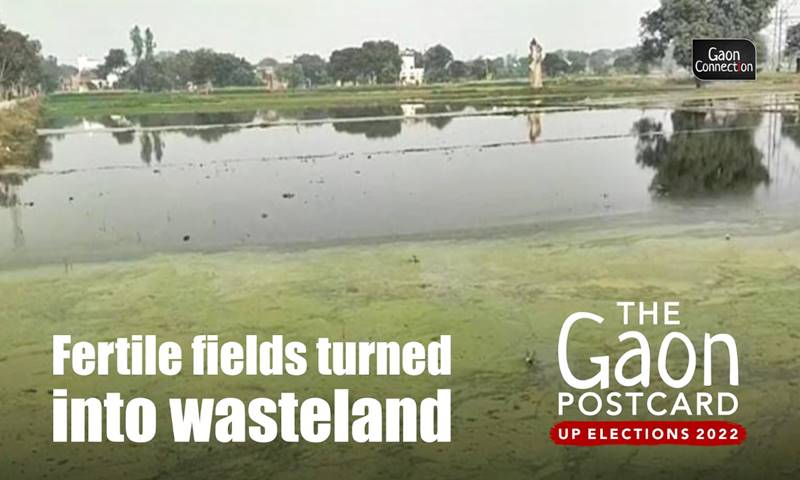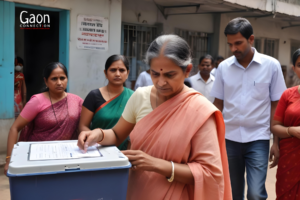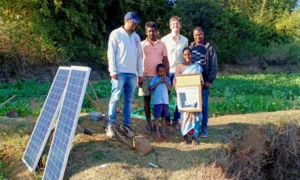Jagapatti (Mirzapur), Uttar Pradesh
It’s been ten years since Dujayi Devi’s six bigha (about one hectare) farmland yielded a single grain. It is not because of lack of care. Despite toiling over the once fertile land in Jagapatti village, Mirzapur, not a blade of grass grows there anymore.
“Ka khayi, ka kamayi. Das saalan se yehi hoye raha. Sab khet doob jaat hai maile paani maa [what do we eat, how do we earn. For the past ten years, our crops are drowning in polluted water],” the 70-year-old woman, told Gaon Connection.
Dujayi Devi is not the only resident of the Jagapatti village that is located on the border of Mirzapur and Bhadohi districts in poll-bound Uttar Pradesh.
None of the 4,000 residents of the village are able to practise farming anymore, which used to be their main source of livelihood.
Putrefying and contaminated wastewater from the factories across the border in Bhadohi district flows through an open drain flooding over 50 acres [about 20 hectares] of agricultural land in and around Jagapatti. Over a period of time, the land has turned barren.
Also Read: UP’s villages might vote again on caste and religion. But what they desperately want: clean water.
“The dirty water that submerges our fields is full of toxic chemicals. These are dumped by the carpet-making factories located in the neighbouring Bhadohi district’s Khamariya town,” 35-year-old Satyaketu Maurya, a resident of Jagapatti, told Gaon Connection.
“We have been requesting the officials to rid us of this water menace but nothing has been done for 10 years. This time, the villagers have decided to not vote in the coming elections,” Maurya added.
The assembly elections in Uttar Pradesh commence today and will be conducted in seven phases. The next phases are scheduled to be held on February 14, February 20, February 23, February 27, March 3, and March 7. The results will be announced on March 10. Jagapatti village is supposed to vote in the seventh phase of the polls which is scheduled on March 7.
According to villagers besides the foul smell there is also the constant threat of vector-borne diseases such as malaria.
“Mosquitoes breed in this water which has submerged the fields. Malaria is very common here. We have to pass through these fields in order to reach our school. The smell is so foul that no one visits us,” Sunita Maurya, an 18-year-old resident of the village, told Gaon Connection.
Also Read: ‘It is poison, not water, that comes out of the handpumps’
Industrial effluent and sewage from Bhadohi destroying farms in Mirzapur
Bhadohi district is famous for its carpet production. According to a study titled The Existence of Carpet Industry in Bhadohi, India which was published in July, 2018, Bhadohi’s carpets are a unique blend of wool and cotton and the products are mainly exported.
According to the state government’s Department of Micro, Small and Medium Enterprises and Export Production, almost 63,000 artisans’ livelihoods are dependent on the carpet industry in the district.
However, the waste disposal measures especially in the rural areas of the district pose a threat to villages in adjoining areas, such as Mirzapur’s Jagapatti.
There are small units in Bhadohi and the manufacturing set up is like a cottage industry, providing a livelihood to the workers in Khamariya town (Bhadohi) situated just over a kilometre away from Jagapatti.
An unlined open drain starts from Khamariya town where effluents are dumped into it, which flow into the agricultural fields of Jagapatti.
Along with the chemical waste of these small units, the untreated sewage from households in Bhadohi also empties into the same drain. And this toxic cocktail seeps into the farmlands rendering them barren.
Pollution control board unaware of the pollution problem
Meanwhile, TN Singh, the Uttar Pradesh Pollution Control Board’s area officer of the Sonbhadra circle (which also included Mirzapur in its jurisdiction) pleaded ignorance about the distress in Jagapatti about the effluents.
“Nobody has raised this issue with the pollution control board yet. We are not aware of it but we will surely take measures to solve the problem if we are directed to do so,” Singh told Gaon Connection.
However, Ratnakar Mishra, the member of legislative assembly (MLA) from Mirzapur acknowledged that there was a problem of the contaminated wastewater submerging cultivable lands in Jagapatti.
“Yes, I’m aware of the situation and have raised the issue in the legislative assembly. The surveying of the land is underway and we will soon provide respite to the villagers,” Mishra told Gaon Connection.
But villagers do not hold out much hope. According to them, they have heard such promises before and they see no reason why a matter that has not been tackled by government officials for so many years, will be solved now.
“I have prepared a file with all the documents including official letters written to the concerned authorities. The file has only gotten thicker but nothing has been done to help us. Our lands and livelihoods have been destroyed,” Satyaketu Maurya complained.
“This year, we have decided we will not trust the officials and will boycott the elections. Politicians here come and go but nothing happens. The village won’t be voting this time,” Sunita, the class 12th student, who was to vote for the first time, said.
‘Budget outlay being prepared’
On December 28, 2021, the protesting villagers walked up to the Mirzapur headquarters, which is situated 14 kilometers away from the Jagapatti village, and raised slogans at the district magistrate’s office to get their grievances addressed.
Following this, Shiv Pratap Shukla, the additional district magistrate of Mirzapur, wrote a letter to the district magistrate in Bhadohi and requested him to ensure that waste is not dumped in the drain in Bhadohi. Gaon Connection has a copy of the letter.
The Bhadohi administration was also asked to construct a cemented drain which would ensure the fields of the farmers in Mirzapur are not affected.
However, more than a month on, no progress has been made on the matter. Vijay Yadav, executive officer in the Khmariya municipality, in Bhadohi, told Gaon Connection, the construction of the drain will begin after the budget is prepared and allocated.
“We are still preparing the budget outlay. Immediate respite is not possible as the bureaucratic procedure is to be followed,” he added.
Meanwhile, Jagapatti residents wait in vain, they say, for the ‘bureaucratic procedure’ to evolve into action on ground.

















